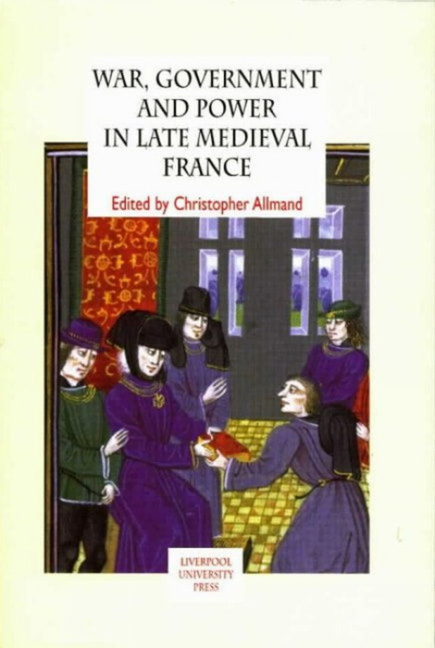Book contents
- Frontmatter
- Contents
- Dedication
- Acknowledgements
- Abbreviations
- Introduction
- 1 From the Court of Hainault to the Court of England: The Example of Jean Froissart
- 2 Froissart and his Second Book
- 3 Alain Chartier and the Arts of Crisis Management, 1417–1429
- 4 Intellectual Patterns and Affective Reactions in Defence of the Dauphin Charles, 1419–1422
- 5 War, Propaganda and Diplomacy in Fifteenth-Century France and England
- 6 History and the Literature of War: The Boke of Noblesse of William Worcester
- 7 Commynes on Kingship
- 8 ‘Centre’, ‘Power’ and ‘Periphery’ in Late Medieval French Historiography: Some Reflections
- 9 Centre and Periphery in Late Medieval France: Tournai, 1384–1477
- 10 ‘Decayed Feudalism’ and ‘Royal Clienteles’: Royal Office and Magnate Service in the Fifteenth Century
- 11 Justification and Theory of the Death Penalty at the Parlement of Paris in the Late Middle Ages
- 12 Membra disjecta of the Breton Chambre des Comptes in the Late Middle Ages: Treasures Revisited and Rediscovered
- Glossary
- Index
10 - ‘Decayed Feudalism’ and ‘Royal Clienteles’: Royal Office and Magnate Service in the Fifteenth Century
- Frontmatter
- Contents
- Dedication
- Acknowledgements
- Abbreviations
- Introduction
- 1 From the Court of Hainault to the Court of England: The Example of Jean Froissart
- 2 Froissart and his Second Book
- 3 Alain Chartier and the Arts of Crisis Management, 1417–1429
- 4 Intellectual Patterns and Affective Reactions in Defence of the Dauphin Charles, 1419–1422
- 5 War, Propaganda and Diplomacy in Fifteenth-Century France and England
- 6 History and the Literature of War: The Boke of Noblesse of William Worcester
- 7 Commynes on Kingship
- 8 ‘Centre’, ‘Power’ and ‘Periphery’ in Late Medieval French Historiography: Some Reflections
- 9 Centre and Periphery in Late Medieval France: Tournai, 1384–1477
- 10 ‘Decayed Feudalism’ and ‘Royal Clienteles’: Royal Office and Magnate Service in the Fifteenth Century
- 11 Justification and Theory of the Death Penalty at the Parlement of Paris in the Late Middle Ages
- 12 Membra disjecta of the Breton Chambre des Comptes in the Late Middle Ages: Treasures Revisited and Rediscovered
- Glossary
- Index
Summary
The patrons of later medieval France’, wrote Peter Lewis in 1964, ‘had no less need of service, support and following [than their English counterparts]; but their attitude to the problem has not received analysis.’ Thus he opened a trail into this quintessential political problem of the period, now familiar to all historians of late medieval France. Much more recently, he has hailed the accumulation of evidence that royal government was infused with clientage, a system which articulated and energised the crown's formal structures, and ensured that the dynamic of politics often came from below. His ‘Reflections on the Role of Royal Clientèles’ will become as familiar as its predecessor to students of the period.
The indifference to these issues in French historiography of the fifteenth century is attributable to the Annales school. In repudiating the clash between Republican nationalism and authoritarian traditionalism, the annalistes recast the debate about national identity through a polemical silence over state construction and territorial aggregation. Ironically, this silence permitted the state to retain its centrality in the historiography. Annaliste methodologies have canalised political history towards institutional, ideological and prosopographical studies, as a glance at the programmes of recent CNRS colloquia shows. This would be more appropriate if the consensus on the political narrative was based on more than shared ignorance. Sadly, our understanding of fifteenth-century politics remains erratic.
Take, for instance, the Armagnac-Burgundian wars, the most serious period of French political and social dissolution between the 1350s and the 1560s. We still have no proper understanding of the nature of the Armagnac cause, its constituency, regional and social; its ideological and institutional underpinnings; its survival into the 1420s, or its convergence with royal Valois politics. ‘Burgundianism’ has responded better to the Parisian bias in the historiography, but large gaps remain. Françoise Autrand's view that it had no legacy is implausible, but the research remains to be done. Less titanic upheavals, such as the Praguerie of 1440, the Bien Public of 1465, and the Guerre Folle of the 1480s, all await their historians. Our knowledge of the royal household is in its infancy, and the charge is being led by seizièmistes rather than medievalists.
- Type
- Chapter
- Information
- War, Government and Power in Late Medieval France , pp. 175 - 189Publisher: Liverpool University PressPrint publication year: 2000



